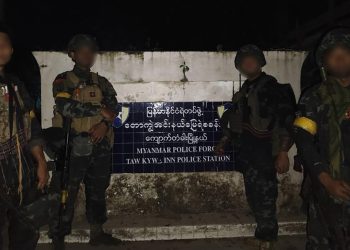The beautiful dream of unified peace in Myanmar has always been phantasmagoric. Since independence in 1948, the country has never been at peace. Political and ethnic rivalries have destroyed the modicum of communal trust that might once have existed. Personal or institutional enmities have morphed into antagonisms so profound and complex that they defy solutions within this generation. Military-civilian hatred, complicated by the 1 February 2021 coup, has erupted in a virtual civil war, or perhaps multiple civil wars. Atrocities and recent executions exacerbate bitterness. Ethnic minorities, badly split among diverse groups as to the type of federalism or autonomy that might be acceptable, distrust each other. Often such populations physically overlap, complicating resolution. The majority Bamar ethnic group of whatever government has denied effective authority to the periphery. And now, religious discrimination and politicization have compounded the myriad issues facing any government.
Surely, the Myanmar military has made an already difficult situation far more dire, its arrogance and antagonisms more profound. Its leadership is of one ethnicity, one religion, and one self-defined set of self-accommodating rules of governance. Power is concentrated: in the barrel of a gun but also in the highly personalized leadership of that institution. History is being rewritten to justify its role, and the censorship that so plagued the state for many years has been reintroduced. The deaths and violence of the present, with the military responsible for its instigation, is now nationally virtually ubiquitous, haunting the memories of those present, and in the subsequent generation making trust even more elusive. Solutions are virtually impossible for many years. Urban guerilla warfare results in assassinations, murders, score-settling, fears, and recriminations. The concept of peaceful resistance to military brutality is over. It may never have been an efficient response, but the present mutual, if unbalanced, violence multiplies tensions and lessens amelioration.
All governments, whether civilian, military or mixed, have called for peace and held formal or informal talks to resolve issues. Despite official media responses from a variety of diverse government sources, real negotiations have never taken place. A cease-fire here or there has been ephemeral, usually verbal. Compromise on essential issues, such as the extent of political power and the distribution of resources to the periphery, has been lacking. Local armed forces or militia have now proliferated, creating fragmented authority and questioned legitimacy. The charade of National Day on 12 February, the anniversary of the 1947 Panglong conference that allowed the formation of an independent Burma, is simply song and dance without substance. The quintessential holiday for the military is now not Independence Day on January 4, but Armed Forces Day on March 27.
The military, perhaps inadvertently, has limited its own options. It has encased itself in a political, ideological, and economic bubble. It protects its leadership from both national and international intellectual and informational pollution, creating its own schools, medical facilities, and economic enterprises to be as independent as possible from the civilian society it strives to control. There is a self-perpetuating orthodoxy of military-speak even by people who are fully cognizant of the outside world and who recognize the depths to which Myanmar has sunk. Public dissent among its leadership is not evident.
The benign image of Buddhism has been contaminated. The military has attacked the elements of the sangha it fears, and, with the connivance of strong leadership elements within, used it to further its control and made it an element of political power. Every government since independence has used Buddhism to enhance its political legitimacy, but the military’s contemporary campaign directly links it to a partisan political base and exacerbates conflict with Muslim and Christian groups — and thus minorities. There does not seem anyone of sufficient stature within the sangha hierarchy whose reputation transcends these secular affiliations.
The West, perhaps Americans more than most, erroneously like to believe there are answers to all problems. Myanmar, alas, defies their aspirations, for neither internally will they be easily resolved, nor externally will they be positively affected. Sanctions here, international pariah status there, assuage foreign morality rather than threaten internal power. Whatever the results of the present conflicts, whatever element emerges with titular authority, the issues will not disappear. Neither present military nor civilian leadership has indicated a capacity to generate a minimum of trust sufficient to govern effectively. An army-controlled state, either unilaterally or through manipulated elections, might command under duress but would be anathema. A government under any civilian leadership now evident could not resolve the fissures. And an effectively balkanized state with diverse ethnic entities would foster regional manipulation and insecurity.
Various formal or informal governments have picked up diverse bureaucratic burdens, often in conflict with each other. The opposition National Unity Government, the junta’s State Administrative Council, the Arakan Army, the Wa, and others vie for bureaucratic control and a funding/tax base within their regions. Administrative chaos results: the people suffer.
Now, “Peace in our time” as in 1938, is more than unlikely: a slogan rather than a plan. A need for hope sustains a beleaguered population, but a constant call for hope defies reality. Would that it were possible to offer it, but illusions destroy policy. A new generation of resilient Burmese of all ethnicities needs to arise to sterilize the cancerous growth of hatred and distrust, and who see a future in unified civility. Only they can accomplish this.
So much for soothsayers who, according to Dante, go to a very low circle of hell, where I am sure to be joined by many of those alluded to above. The prospects, alas, for the present are dim indeed.
David I. Steinberg is distinguished professor of Asian studies emeritus, Georgetown University

















